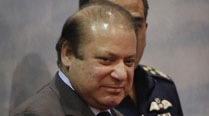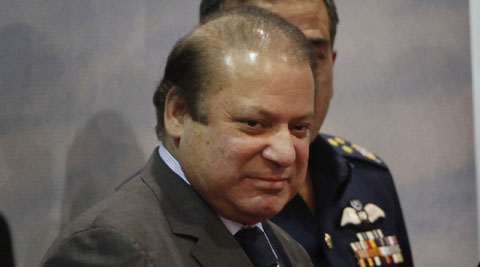Opinion Pakistan needs a new story
Fighting the Taliban will be a long haul. Better relations with India will make it easier

 If Pakistan asks a future-oriented question, India has far more constructive possibilities than its three current friends. (Source: AP)
If Pakistan asks a future-oriented question, India has far more constructive possibilities than its three current friends. (Source: AP)
It is foolhardy to write on Pakistan. The country reveals the limits of most political analysis. Most political analysis explains violence in terms of something else: fundamentalism, tribal anti-imperial resistance, injustice, military use of mercenary groups etc. That “something else”, offered as an explanation, often turns into a rationalisation. With certain sorts of violence, we have to admit that our social explanations cannot do away with the obscurity of violence. Many societies deploy violence in different ways. But the depth of crisis in a society can be measured by the degree to which violence escapes the boundaries of instrumental logic. It threatens to become sui generis, where the point of violence is, to a certain degree, violence itself. It becomes a syndrome, not an instrument.
It is also awkward for Indians to comment on Pakistan. Pakistan has some incredibly brave commentators. Its literary culture captures the violent absurdity at the heart of Pakistan with an unmatched depth and precision. But it is equally true that even in the midst of tragedy, an Indian comment, even an act of solidarity, is intentionally misunderstood as a conspiracy or condescension or both. In many circles, this psychological fragility is still quite apparent. Here again, the means become an end: there are no historical forces that can now explain the character of anti-India resentment; rather, it is the resentment that drives the understanding of historical forces and, therefore, leads to a misdiagnosis. This is why much of the talk about addressing root causes, reassuring gestures, seems to miss the point. Some of this may help at the margins. But at this stage, it is mostly irrelevant. And given the record of the Pakistani state, Indian gracelessness is the least of its problems. The history of India and Pakistan is marked by a series of traumas, from 1947 to 1971, and then the recurring shadow of terrorism, on which Pakistan’s attitude has been self-defeatingly abominable. But in a strange way, India is actually the only possible real friend Pakistan has among the Great Powers. And if it recognises this, it could open more political space for itself.
Counterintuitive as this might seem, it is actually true. There are several reasons. Take America first. Anti-Americanism in Pakistan is now a prop for its victimhood and needs to be resisted. But the plain fact is that American strategy, not just in Pakistan, but elsewhere in West Asia, has been stunningly myopic. To build modernity, you have to build strong states. It takes a peculiar kind of obduracy not to recognise that if you saturate any region with billions of unaccounted for dollars, and proliferate armed groups, you will, at some point, have an intractable problem on your hands. The proliferation of instruments of violence will outstrip any political logic. Every region, from Iraq to Pakistan, where this has happened has got burnt. Pakistan let itself be used, but the American logic of proliferating instruments of violence is still strong. The relationship with America has distorted the balance of civil-military relations inside Pakistan completely.
All the autonomous forces that could have emerged from Pakistani civil society have been short-circuited, in part by the legitimacy the Americans gave to the Pakistani military and, for all their surface exasperation, will continue to do so.
China is now going to play a similar role. There is something touching about an all-weather friendship. But the net result of the tight embrace of China and Pakistan will be more of the same: a strengthening of the military and the forces of violence at the expense of the politics of civil society. So long as the military hands over what the Chinese want, China will, in the final analysis, continue to strengthen its hegemony. Pakistan’s other big backer, Saudi Arabia, has been the epicentre of a destructive ideological ferment in Islam. It, too, will favour greater militarisation. And it, too, will be, in the end, more comfortable with the forms of fundamentalism now destroying Pakistan.
But most importantly, the embrace of any of the three bankrollers of Pakistan is almost guaranteed to close off political opportunities for the country. None of the three has a really deep interest in resolving the problems of the region. Thinking commentators in Pakistan say that it needs a new narrative. But this is often articulated as a return to Jinnah’s Pakistan, as if recapturing those founding ideals will save the country from the scourge of violence. This has limited possibilities at best. No matter how progressive, any ethnically defined homeland — whether Muslim, Hindu or Jewish — runs up against limits very fast. It cannot entirely escape the question of benchmarking Pakistan’s identity against some notion of Islam. And that always puts minorities at risk. The treatment of Shias and Ahmadiyas is nothing short of a scandal. But its roots go back to even progressive thinkers like Iqbal. There is also no credible political articulation of those ideals.
Finally, political narratives are not changed by homilies to the values of the founding fathers. They have to be forward looking. Where does the nation want to end up? What else can it do to excite people? The anxieties of identity can be quelled only if there is some other narrative to tap into.
If Pakistan asks a future-oriented question, India has far more constructive possibilities than its three current friends. India can be the conduit through which Pakistan can more fully join Asia’s growth party. It can end this absurdity of trying to reinvent itself as a West Asian state, with all the oppressive ideological baggage that carries. Fighting the Taliban will be a very long haul. Better relations with India will make its fight easier. Besides deployment of force, it will also require alternative economic paradigms. Can Afghanistan and northwest Pakistan have a serious economic future if they cannot be restored to their natural geography of trade? Will any of its three friends really push for this? Economic determinism is false. But as a political strategy, saying “we have clear red lines on not tolerating violence but are open to trade, investment, exchange” is not a bad idea. This is what India is offering but Pakistan wants the opposite: blurry lines on violence. The grief in India at the Peshawar attacks was genuine. The scale of the government’s gesture was unprecedented. Which is why Zaki-ur-Rehman Lakhvi’s bail was disconcerting. For it was further proof of how stupid the Pakistani state has become: it embraces as friends all those who will destroy it but will shun the one state that can genuinely help. Hope Pakistan can now reverse the tide.
The writer is president, Centre for Policy Research, Delhi, and a contributing editor for ‘The Indian Express’
express@expressindia.com




